Arieh, the son of Hilda and Moshe, was born in Haifa on September 19, 1953. He completed his elementary and high school studies in a number of schools, due to the family’s wanderings in Israel and abroad. Aviv, who was an ardent student, was a great athlete and loved the diving, which he knew about her charms and mysteries when he lived in Eilat for a while, but most of all he loved horses and spent a lot of time, He learned to ride from his youth, and as a student in the eighth grade his parents bought him a special riding horse and he won first place in the Elipo He was a member of the horse riding association, which he was a member of, and in the summer of 1971 he was sent to Germany as a member of the training team of the Israeli national team for training in gymnastics, riding and taming. The horses, which had been a common denominator for most of them, brought him to places far away from the noise and density of the city, and he loved the expanses, the whistling of the wind and the speed, and on his vacations he galloped around the country. Erik was a tall, solid, athletic man who loved life and excelled in youthful joy and humor. By nature he was kind, loyal and very devoted, especially to the people he loved. He was always willing to help anyone and do his best, even at the expense of his comfort and well-being. His great self-confidence and his independent personality gave people a sense of security. It was as if he had never been afraid, either because he was not afraid of harm or because he was so sure of his powers. He was loved by his family, his girlfriend, and his close friends, but he never acted contrary to his principles in order to be liked by everyone. He was whole with himself and wanted to live honestly with himself and with others, and was never hypocritical. When he was fifteen, he traveled with his family to Kenya and lived there for five months. The primitive land, the wild landscape and the change of life in Israel, left a strong impression on him. Arieh was drafted into the Israel Defense Forces in early November 1971. After completing basic training, after completing a course for combat medics, he worked for a period of time with reservists in the Jordan Valley. Because of his independent personality and his dislike for the conventions, he found it difficult to accept authority, but he was very fond of his army service, volunteering to serve in the commando unit, for he saw it as a possibility of self-fulfillment and not as a simple means of transferring three years of his life. To carry an injured person on his back and to run for miles without stopping He asked him to change him, and he would invite them to the clinic, where they would sit for long hours and talk about a cup of coffee, and in one of his “clinic talks” with his friends he once said, “I want to gather into a room One of all the people I love; To know that if I go to war I do it for the same group as my loved ones, and I do not care to fall knowing that I did it for the sake of those beloved people. “At the time, he did not know that his words had come to fruition. In the Yom Kippur War, Arik fought in the Golan Heights, but was a member of the company, but in practice he was a member of a team like the rest of the fighters. In evacuating casualties, he treated the woundedOn the fourth day of the war, on the 9th of Tishrei 5734 (9.10.1973), when he and his comrades traveled to rescue the wounded of our forces, they encountered an ambush by Syrian soldiers, who, at the beginning of the battles, Bromont, in addition to Uzi, operated it with precision and efficiency. In the battle that took place he was hit by enemy fire and killed. His friend, who was horrified at the sight of his injury, said at the last minute: “It’s okay, you do not need anything,” and he died. Arik was laid to rest in the military cemetery in Kiryat Shaul. Survived by his parents and brother. Arik was laid to rest in the military cemetery in Kiryat Shaul. Survived by his parents and brother. After his fall, he was promoted to First Sergeant. In his memoirs, Menachem Sadan, his teacher at the New High School, wrote: “… the seriousness of your childhood grew more serious … You were endowed with the extraordinary power of perseverance that was in you, a kind of tenacity and devotion, And admiration. “
